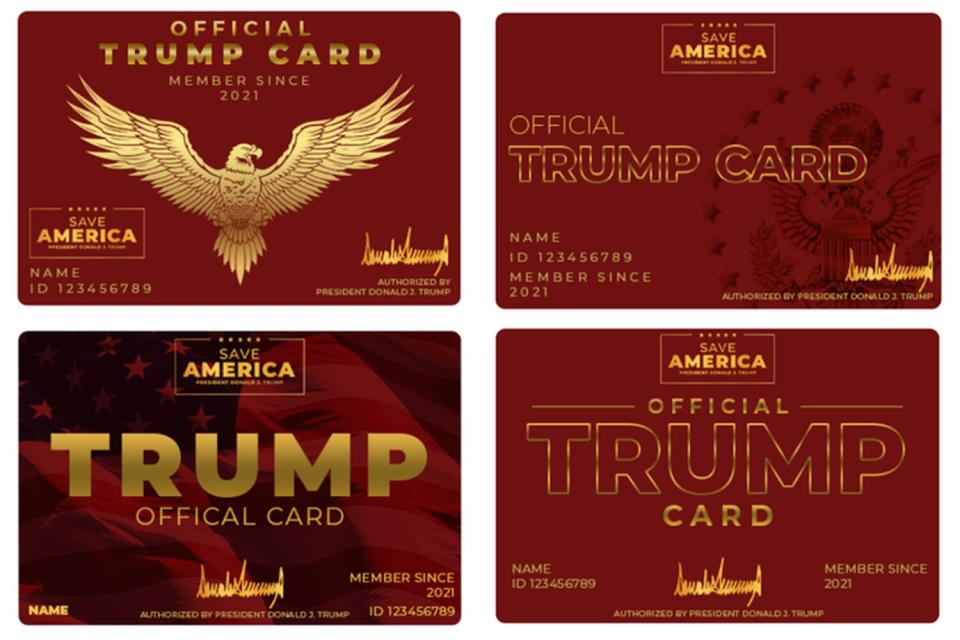Donald Trump Asks 'Dedicated' Supporters To Pay To Carry Misspelled 'Trump Offical Card'

Melissa Sue Gerrits/Getty Donald Trump
Donald Trump wants his supporters to carry so-called "Trump Cards" with them — and, as part of his latest fundraising gimmick, is even giving them a say in the design with a handful of options, one of which misspells the word "official."
In two emails sent to supporters on Wednesday, Trump's Save America political action committee requested the former president's followers consider carrying the red-and-gold object resembling a credit card to show their devotion to the 75-year-old politician, according to Business Insider.
"The card you select will be carried by Patriots all around the Country," the first email read. "They will be a sign of your dedicated support to our movement to SAVE AMERICA, and I'm putting my full trust in you."
The second email said Trump Cards will be "reserved for President Trump's STRONGEST supporters." Neither email further detailed the purpose of the card nor outlined what qualifies a person to carry it.
It is unclear when the card would be issued, as well.

Save America PAC Trump card design options
RELATED: Donald Trump Reportedly Said He Could Beat George Washington in an Election
Supporters have four different designs to choose from. The first option includes a gold bald eagle centered on a solid red background below the phrases "Official Trump Card" and "Member Since 2021."
The second is a card with the U.S. seal on the lower right-hand side, near the former president's distinctive signature, which appears at the bottom of each option. The words "Official Trump Card" are found on the left side, while the phrase "Save America" is pasted in a box at the top.
The third option is perhaps the most intricate, with a rippling American flag background and the misspelled "Trump Offical Card" printed boldly in the center. The "Save America" box remains in the same spot, while his signature is centered at the bottom.
The final choice is the simplest: a solid red background with "Official Trump Card" printed prominently in the middle. The "Save America" box sits above the phrasing.

Jabin Botsford/The Washington Post via Getty Donald Trump
RELATED: 60% of Americans Say a Donald Trump 2024 Bid Would Be 'Bad for the Country,' According to Poll
"We recently met with the President in his Florida office and showed him four designs," the second email said. "Originally we were planning on releasing just one design, but when President Trump saw the cards on his desk, he said, 'These are BEAUTIFUL. We should let the American People decide - they ALWAYS know best!' "
The cards do not appear to be given freely, though. Instead, supporters who click the link to vote on a design are redirected to a fundraising page, where they are met with a message encouraging them to contribute to the Save America PAC.
"President Trump appreciates your input, and now he's calling on YOU to take the next step and SAVE AMERICA!" the message said.
RELATED: 22-Year-Old Impersonator Charged with Tricking Donald Trump Supporters Into Giving Him Thousands
This is the PAC's latest attempt to raise money from the 75-year-old Trump's supporters. An email from July 26 said signed photos of the New York Republican would be on sale for $45 apiece, according to Business Insider.
According to a recent poll from Quinnipiac University, 73 percent of Republican participants believe it is a good idea for Trump to run again in 2024. Yet 60 percent of the people surveyed (including Democrats and Independents) believe another Trump bid would be "bad for the country."
The study surveyed 1,290 U.S. adults nationwide with a margin of error of +/- 2.7 percentage points, according to the university.

